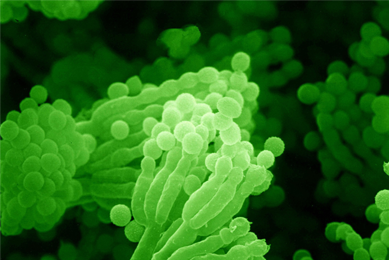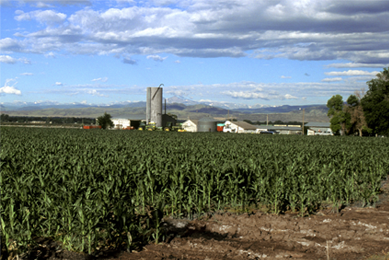Why Fusarium oxysporum f. sp. cubense is important
A significant threat to bananas (Musa spp.) is the fungus Fusarium oxysporum f. sp. cubense (Foc), specifically tropical race 4. Foc is currently found in 21 countries and is the causal agent of Panama disease, also known as Fusarium wilt.1 The characteristic sign of Panama disease is internal vascular system discoloration, with coloring varying from yellow all the way to black. This causes the xylem to become plugged, preventing the transport of nutrients and water. As the infection develops, older leaves turn yellow and split followed by the wilting of younger leaves and ultimately plant death.
One of the most notable impacts of Foc is the destruction of the Gros Michel cultivar as a commercially viable crop. Gros Michel was the main variety grown for export until the 1960s when Foc race 1 wiped out a majority of Gros Michel plantations. In its place, the Cavendish cultivar was selected for commercial growth due to its resistance to Foc 1. The Cavendish cultivar contributed to a global export volume of about 22 million tons of bananas in 2020.2 However, Cavendish bananas are currently being threatened by Foc tropical strain 4, with no suitable replacement. The main obstacle in finding a replacement cultivar is that commercial bananas are propagated exclusively via vegetative cloning, which results in minimal genetic diversity and low natural resistance to Foc races. Additionally, eradicating Panama disease from soil is difficult due to the fungus itself, which produces chlamydospores that can survive in soil and water for decades, and the presence of asymptomatic infected weeds that act as persistent reservoirs for the fungus.3
How we can help
ATCC’s catalog contains around 30 distinct isolates of Foc, from all over the world. Understanding the underlying mechanisms and genes that contribute to the virulence of this pathogen is critical to combatting it.4 The ATCC Genome Portal aims to provide high quality, authenticated reference genomes to the scientific community. Currently three Foc isolates ATCC® 96289™, ATCC® 38741™, and ATCC® 13721™ have annotated genomic data available on the Genome Portal. As more Foc isolates and other related plant pathogens in ATCC’s collection are sequenced, the data generated could potentially provide novel insights into how to better combat this pathogen.
Did you know?
Currently, there are 5,750 reference-quality genomes on the ATCC Genome Portal, and it is continuing to grow each quarter.
Meet the authors
Kaitlyn Bentley, MS
Biologist, Sequencing & Bioinformatics Center, ATCC
Kaitlyn Bentley is a Biologist in the Sequencing and Bioinformatics Center at ATCC. Her work involves the extraction of nucleic acids from various microbes and cell lines, establishing quality reference data for the ATCC genome portal. Kaitlyn received her master’s degree in forensic science from Syracuse University, where her research focused on forensic microbiology.
Noah Wax, MS
Biologist, ATCC
Noah Wax is a Biologist in the Sequencing and Bioinformatics Center at ATCC. His work focuses on the extraction of nucleic acids from the various organisms and cell lines found within ATCC’s collection. Noah plays a vital role in supporting two significant initiatives: the ATCC Genome portal and ATCC Cell Line Land. The latter is an ongoing partnership between ATCC and QIAGEN aimed at providing authenticated reference RNA-seq data for all ATCC cell lines. Prior to joining ATCC, Noah received his master’s degree in biology from Virginia Tech where his work focused on utilizing comparative genomic approaches to study amphibian skin microbes.
Explore our featured resources

Discover the ATCC Genome Portal
The ATCC Genome Portal is a rapidly growing ISO 9001–compliant database of high-quality reference genomes from authenticated microbial strains in the ATCC collection. Through this cloud-based platform, you can easily access and download meticulously curated whole-genome sequences from your browser or our secure API. With high-quality, annotated data at your fingertips, you can confidently perform bioinformatics analyses and make insightful correlations.
More
Mycology
Mycology strains are vital for advances in biomedical, pharmaceutical, and commercial research, which is why ATCC offers a vast collection of antimicrobial-resistant fungal strains, quality control organisms, and genomic fungal DNA.
More
Plant Disease Research
Plants are vital for life on Earth. Yet, they are continually put at risk by the introduction and spread of pests and pathogens. Partner with ATCC to discover how we can protect these valuable resources together.
MoreReferences
- García-Bastidas F, Drenth A, Kema GHJ. The past, present and future of Fusarium wilt of banana caused by Tropical Race 4. In: University of Queensland, Australia, Drenth A, Kema GHJ, Wageningen University, The Netherlands, eds. Burleigh Dodds Series in Agricultural Science. Burleigh Dodds Science Publishing; 2024.
- Food and Agriculture Organization of the United Nations. Banana Market Review Preliminary results 2020. Rome: Food and Agriculture Organization of the United Nations; 2021. Accessed August 14, 2025.
- Ploetz RC. Management of Fusarium wilt of banana: A review with special reference to tropical race 4. Crop Protection 73: 7-15, 2015.
- Chen D, et al. Current progress on pathogenicity-related genes in Fusarium oxysporum f. sp. cubense tropical race 4. Phytopathol Res 6(1): 53, 2024.